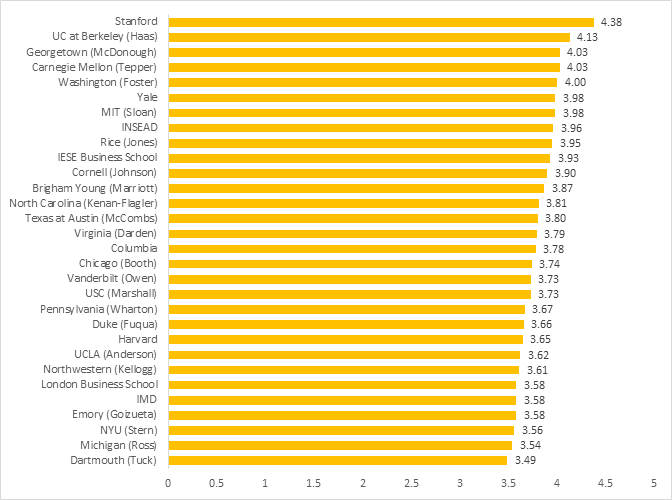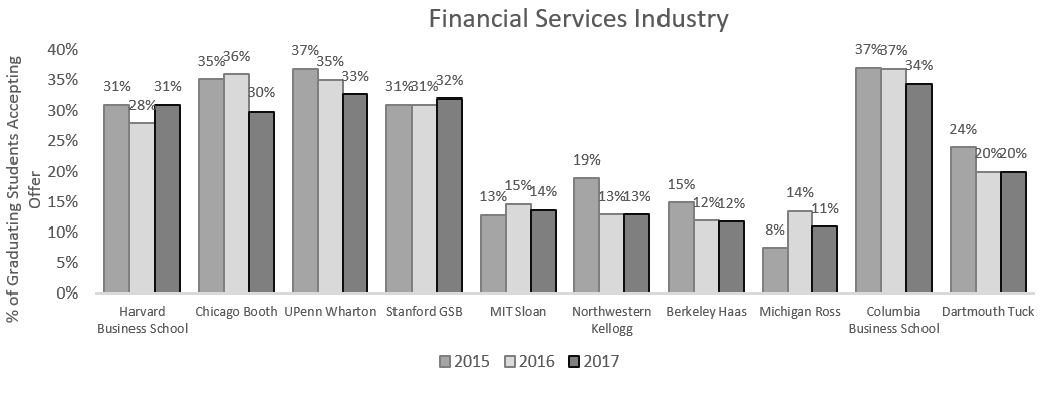The MBA Career Services and Employer Alliance (CSEA) recently shared the results of its 2021 Fall Recruiting Trends Survey. The findings show that recruiting is bouncing back to pre-pandemic levels for full-time MBA students, particularly within the consulting, technology, healthcare, and financial services industries. But certain pandemic trends may be here to stay. The findings highlight the continued relevance of virtual engagement opportunities between students, career services, and employee recruiters.
The survey includes responses from 77 CSEA member schools, who completed the survey in January of 2022.
Among full-time MBA programs, just over two-thirds of schools (35 percent) report that on-campus recruiting opportunities for MBA students, which includes in-person or virtual interviews organized through the school, are up this academic year compared to last. Just 27 percent report that opportunities are down, a sharp decline from 47 percent in 2020. Similarly, the majority of schools (74 percent) report that off-campus recruiting and job postings have increased in 2021.
Most schools report increases in recruiting activities for full-time post-MBA employment within the consulting (84 percent), technology (82 percent), and healthcare (69 percent) industries. Schools continued to see decreased recruiting activity within the hospitality sector (33 percent), although the number of schools that experienced these decreases was smaller in 2021 than in 2020 (61 percent). Most schools’ recruiting activity, 76 percent, increased among large firms (more than 500 employees), and 63 percent saw increases in recruiting by mid-size firms (100-500 employees). The survey results note that, in previous years, schools were most likely to indicate recruiting increases by firms not headquartered within the school’s geographic region, which in 2021 was the third-largest increase (63 percent).
In the survey, schools were also asked how student engagement with various career support activities compared to the prior year. The biggest increases were with one-on-one coaching appointments (50 percent of schools), virtual career fair participation (48 percent), and group coaching sessions (47 percent). Conversely, student engagement decreased the most among in-person career fair participation (58 percent of schools), on-campus interviewing (49 percent), and information session attendance (42 percent).
Fall 2021 also brought changes in students’ interactions with recruiting activities. Most schools report that employers’ use of virtual interview technologies increased (90 percent), as did the use of AI-powered pre-interview screening tools (75 percent). A large number of schools, 68 percent, indicate an increasing use of virtual multi-school events. Schools also note growth in alumni-initiated hiring (62 percent), and virtual career fairs (61 percent). Conversely, almost two-thirds of schools report a decrease in student engagement with in-person career fairs (64 percent).
Similar to the full-time employment recruiting trends, both off and on-campus opportunities for internship recruiting were more positive in 2021 than in 2020. Almost two-thirds of schools, 65 percent, report an increase in off-campus internship opportunities for full-time MBAs. And, over one-third, 36 percent, report that on-campus activities have increased, which compares favorably to the 16 percent of schools that reported increases in 2020. Again, similar to the full-time recruiting trends, most increases in internship recruiting were within the consulting (73 percent of schools) and technology (71 percent) industries. Financial services (60 percent) came in third.
A large proportion of summer internships in 2021 remained in a virtual format. More than half of schools (56 percent) report that over 60 percent of their students’ 2021 summer internships were virtual, whereas in 2020, over 83 percent of schools reported predominantly virtual internships.
Find the full survey results here, including data on full-time and internship recruiting for part-time MBA and specialized masters programs.











